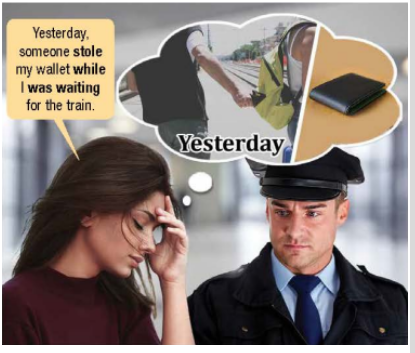Hãy nhập câu hỏi của bạn vào đây, nếu là tài khoản VIP, bạn sẽ được ưu tiên trả lời.

1.After I had had dinner,I watched TV
2.After we had bought a newspaper,we had a coffee
3.After we had played tennis,we went home
4.When my cousin phoned,I had gone to sleep
5.When we arrived at the match,Mesi had scored two goals
6.When their mother got home,the children had done the housework

1. arrived
2. closed
3. were sleeping
4. was taking off
5. saw
6. opened
7. read
8. put
9. picked up
10. went
11. was
12. was not raining
13. were walking
14. crossed
15. followed
16. didn’t know
17. were going
18. didn’t want
arrived - closed - were sleeping - was taking off - saw - opened - read - put - picked up - went - was - wasn't raining - were walking - crossed - followed - didn't know - were going - didn't want

a. was listening / started
b. fell / realised / jumped
c. swam / came / climbed / were arguing
d. began / was deciding / heard

1. are owned
2. were sold
3. are often used
4. is usually answered
5. is accessed
6. are sent

a. We use the second conditional to describe an unreal or imaginary situation and its result.
(Chúng ta dùng câu điều kiện loại 2 để mô tả những sự kiện không có thật hoặc tưởng tượng ra và kết quả của chúng.)
If shops didn't exist (imaginary situation), we would buy (result) everything online.
(Nếu các cửa hàng không tồn tại (tình huống tưởng tượng), chúng ta sẽ mua (kết quả) mọi thứ trên mạng.)
We use the (1) past simple in the if clause and we use (2) would + (3) infinite in the main clause.
(Chúng ta sử dụng thì quá khứ đơn trong mệnh đề if và dùng would + nguyên mẫu không to trong mệnh đề chính.)
b. We can put the main clause first. In this case, we don't need the comma.
(Ta có thể để mệnh đề chính lên trước. Trong trường hợp này, ta không cần dấu phẩy.)
I'd buy you a present if I had enough money.
(Tôi sẽ mua cho cậu một món quà nếu tôi có đủ tiền.)
c. We use could to mean would + be able to. It is also the past simple of can.
(Ta dùng could với nghĩa là would + be able to. Nó cũng là thể quá khứ đơn của can.)
If I won the lottery, I could stop work.
(Nếu tôi thắng xổ số, tôi có thể nghỉ việc.)
If she could speak English, she'd get a job in the USA.
(Nếu cô ấy có thể nói tiếng Anh, cô ấy có thể có việc ở Mỹ.)
The world would be much better if money didn’t exist.
If money didn’t exist, how would you buy things?
If you needed something, you would make it.
If you couldn’t make it, you would swap with somebody else.
So if I wanted a new mobile phone, how would I get it?
If money didn’t exist, life wouldn’t be better for poor people.
If nobody had any money, everybody would be equal.


While Harry was climbing back onto the boat, he remembered something. (Khi mà Harry đang leo trở lại thuyền thì anh ta nhớ ra gì đó.)
When Harry found a case of money, he was swimming to the shore. (Khi Harry tìm thấy cặp đựng tiền thì anh ta đang bơi vào bờ.)
While Harry were fighting with three people, he heard gunshots. (Khi mà Harry đang đánh nhau với ba người kia, anh ta nghe thấy tiếng súng nổ.)
While Harry was helping the person in the sea, he saw a shark. (Khi mà Harry đang giúp người đó ở dưới nước, anh ta thấy một con cá mập.)
While Harry was putting on dry clothes, he saw a helicopter. (Khi mà Harry đang mặc đồ khô lên người thì anh ta thấy một chiếc trực thăng.)